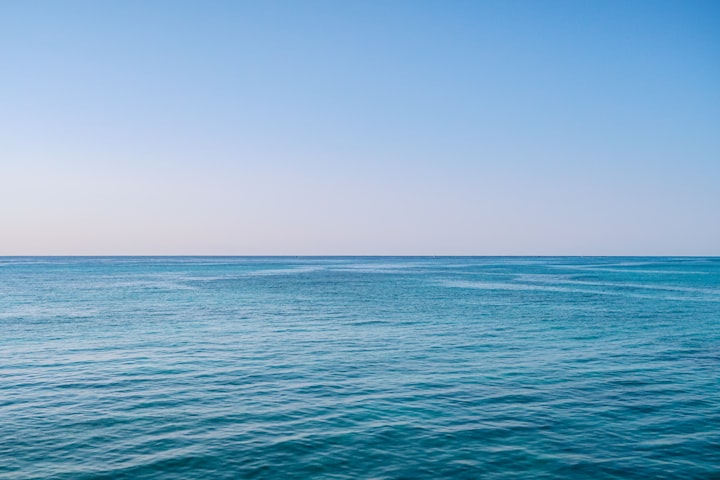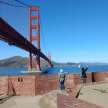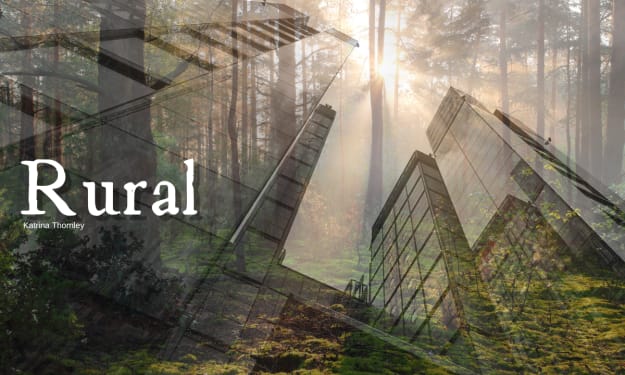Living On The Edge Of The Western World
What It Feels Like

I live in San Francisco, just 6 blocks from the Pacific Ocean, on the very edge of the Western world. Whenever I walk out my door, I can see the bright blue ocean and the rolling white surf pounding the shoreline, and the waves gently washing up on the beach. It is a beautiful and majestic sight.
The viewpoint here is profoundly different from my birthplace in Chicago, Illinois, in the heart of the land-locked Midwest, although even then I was nestled close to the comfort of the huge Lake Michigan, one of the five Great Lakes, and visited the water often.
Water has always been a source of comfort to me, allowing me the luxury of contemplation, maybe because I am a Pisces, a water sign. And even though I was raised near Lake Michigan, when I fly back there, despite the comforting presence of the Great Lakes, I also cannot help but notice from the airplane how very flat the Midwest really is.
There are a few mountains, like the Black Hills in South Dakota, but from an airplane, the overwhelming impression is the flatness of the area. The Midwest is all locked together like pieces in a jigsaw puzzle, all the flat agricultural Midwestern states, like Illinois, Indiana, Iowa, Kansas, Michigan, Minnesota, Missouri, Nebraska, North Dakota, Ohio, South Dakota, and Wisconsin, the breadbasket of the country.
Actually driving through these states, which I have done, only reinforces the flat insularity of the region, and perhaps partially explains why people who are born and raised back there think the way they do. It is not a matter of right or wrong but it is definitely a different perspective.
And when you drive back there you are lucky to see a hill, let alone a mountain or a cliff. Life there is ruled by the weather and by the raising of crops to feed the country, a totally noble and necessary occupation. We all have to eat! The Midwest is called Americas’s breadbasket.
One of my uncles had a dairy farm in Wisconsin and I spent a summer with him and my aunt and a whole bunch of cousins. I was amazed at seeing my very young cousins driving tractors and herding cows out in the morning to graze at dawn and back at night to be milked.
My uncle had pigs and silos and cornfields, so I guess it was a pretty big farm. And we ate fresh food every day. Oh, and I discovered there is something called morning dew which makes the grass wet at dawn, and that chickens really don’t like it when you collect their eggs.
But living in San Francisco, I am also always acutely aware of the fragility of human life, of the proximity of a whole ocean of water just blocks from my house. From the reality that far past the visible horizon lies what we were taught was the exotic, inscrutable East, countries like Japan, Korea, China, in fact, all of Asia.
Now of course I realize we are all just people, and many of our Far Eastern neighbors may think we are exotic and so very different. But we’re not.
I feel a definite link, a strong, sure connection to the other side of the world from my viewpoint here on the edge of the western world and the far shores of the eastern world. It is real, and the connection is inescapable.
There is a different perspective, living here on the west coast, on the edge of the Western world, a feeling of unity and togetherness, a realization that we are all people on one fragile planet.
And that the rugged mountains, hills, and rocky cliffs of the West coast are infinitely different from, yet remarkably similar to, their counterparts on the other side of the world, maybe even more so than our geographical sister states in the Midwest.
You can actually see the curvature of the earth if you stand on the sands of the shore of the Pacific Ocean and gaze westward. The sky is like a big bright blue inverted bowl, and the notion that if you dared to sail over the edge of the horizon you would inevitably fall off the planet is laughable now, even though it was once accepted as common knowledge.
This new knowledge that we are all together, linked together not only by the ocean but by the atmosphere itself, becomes tremendously important from my daily point of view.
All the petty wars and land grabs and power struggles that have dominated human history since time has been recorded seem both very remote and far away, and yet ever-present, not just in times past because they are still happening today.
But it is all inherently, tragically wrong in the very concept, it is a seriously flawed model of the real world order. What we need to do is be realistic, and adopt a real-life, real-time viewpoint, one of peace, togetherness, and harmony that we should all be striving to achieve together.
It’s not simply the advancement of some particular political or religious viewpoint, but a viewpoint that reflects the reality of our short life spans on planet Earth. And the need to treat the planet as a shared resource.
There is no getting around it, we are all members of the same planet, and the vivid reality of this knowledge is hammered home to me every single day from my perspective of living on the edge of the Western world.
I sometimes wonder if our counterparts on the other side of the Pacific ocean feel the same way when they gaze out eastwards to the invisible continent of America
They surely must, because in the end, it is not about nations or countries. It is about the symbiosis between the planet and its elements, the water, the sky, the atmosphere, and of course including all the people living here today, this day, today, on this planet we all share, the planet we call Earth.
Sometimes I feel like sending a message in a bottle, just cast it into the ocean, and wonder if it will be able to survive the thousands of miles of water that separates San Francisco from Japan, exactly 5,133 miles or 8,2701 kilometers. Sounds like a long way off.
But the point is that they do exist, and whenever I fling a rock that has washed up on the beach back into the water, I wonder if some counterpart of mine is doing exactly the same thing, at exactly the same time, on the other side of the world. Hmm…
The concept truly boggles the mind, but in a strange way, it is very comforting to realize and know for certain that we are all indeed inextricably linked together, tied together and that we are all here for just a short time.
And that we all need to do our part to save the planet, from the polluters, the greedy industrialists, the warmongers, and the religious zealots, because this planet does not belong to them, it was never meant for them.
It exists for us, it exists for you and me, and we all share this certain knowledge that it is our responsibility to ensure the preservation of the planet.
It is all crystal clear, living here, on the edge of the Western world…..
About the Creator
John Whye
Retired hippie blogger, Bay Area sports enthusiast, Pisces, music lover, songwriter...
Enjoyed the story? Support the Creator.
Subscribe for free to receive all their stories in your feed. You could also pledge your support or give them a one-off tip, letting them know you appreciate their work.






Comments
There are no comments for this story
Be the first to respond and start the conversation.